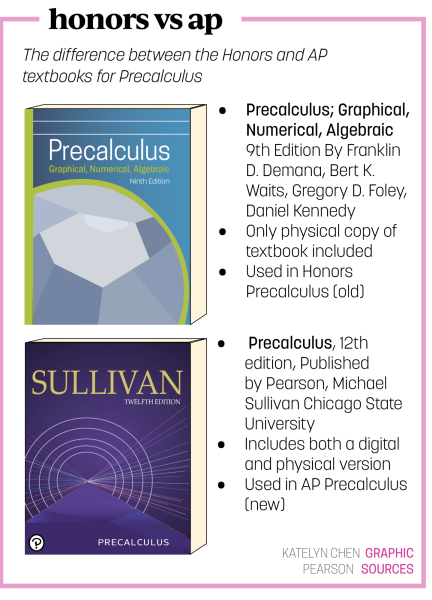For sophomore Elia Lu, the transition from honors Algebra II, a course she took during her freshman year, to AP precalculus BC has been both challenging and illuminating. She said the move to an AP class brings a noticeable increase in workload and a shift in curriculum that highlights the differences between honors and AP courses. According to Lu, the difference in the difficulty of honors classes compared to that of AP classes was a hurdle for her to navigate. For example, she said one of the main reasons she did not take AP World History as a freshman was that she was scared of the workload, the difficulty of the material and the AP exam.
Lu said, “AP World (History) seemed really intimidating just because of the idea of a huge final at the end of the year and just the amount of reading that I would have had to do. It seemed really scary. But in retrospect, I would have taken AP World (History) because I feel like the people who did got a lot more out of it and got to learn material from a different perspective.”
Recently, the choice between honors and AP precalculus became more complicated as a new requirement led to the replacement of the honors class with AP precalculus BC and AP precalculus AB. Since this change is relatively new, there are no definitive statistics about this replacement. However, students and teachers at CHS have differing opinions about the effectiveness of the change.

(Riva Jain)
Laura Diamente, AP precalculus BC and honors precalculus teacher, said in terms of curriculum, the AP style course focuses more on the reasoning and less about raw calculation. She said this is beneficial because it allows students to really internalize concepts instead of solely focusing on the calculations.
Diamente said, “The difference in curriculum allows AP students to understand concepts on a deeper level which will eventually translate to more versatility in calculation. One class is not necessarily better than the other. It ultimately comes down to what the student wants. AP precalculus BC replaced honors precalculus this year so they are pretty similar, but now there are other levels of precalculus that are comparable to the ones that got replaced.”
Diamante said, “Honors classes and AP classes, at least for math, have a similar homework load, but the AP course focuses a bit more on critical thinking and the method of solving a problem rather than the solution itself.” As for performance, she said most students should be able to do relatively well as long as they are willing to work. “It is the first year of AP precalculus BC here at CHS, so a lot of this is relatively new, but historically, students have done pretty well in honors,” Diamente said.

Lu echoed this sentiment. However, she added the class workload and curriculum vary from class to class.
Lu said, “I think that the AP math situation is a bit different. Since AP precalculus BC replaced honors precalculus, the work and actual material isn’t that different, but that depends on the class itself. One other AP class I’m taking is AP Seminar, and this class is way different than honors English. I know that the class itself isn’t the same, but it is still important to take into account that AP Seminar, in my opinion, is a lot harder in terms of work and requirements.”
According to Sandy Weisner, a teacher who has taught both AP and honors Chemistry, the curriculum for AP Chemistry builds further on the material taught in honors Chemistry by introducing new concepts and calculations.
Weisner said, “AP Chemistry is a lot more specific. For example, in first-year chemistry you don’t learn so much about acids and bases. Specifically, first-year chemistry learns about strong acids and bases and how to calculate pH. However, the AP class includes that stuff but also a bit about buffers and calculating the pH of buffers. The class is building on foundations that you are expected to have mastered by the time you finish honors chemistry. I think the fact that AP Chemistry isn’t a requirement for graduation means that most of the students that are in the class tend to perform well and are more motivated to study because they chose to be there, but to be honest, both classes work hard, but AP chem students just have more work.”
For the most part Lu said she agrees with this statement.
Lu said, “AP classes aren’t a graduation requirement, and whenever I complain about the amount of work, I realize I did it to myself. In a way this makes me more motivated to study and work harder in those classes. Plus the class is fully weighted; it not only boosts my GPA, but also offers college credit. This incentivizes me to actually try to participate in class and understand concepts.”
Weisner said, “Ultimately, students get out what they put in. For the most part, my AP students are motivated to do well in class whether that be because of the GPA boost, the AP exam, or college credit.”




























![Keep the New Gloves: Fighter Safety Is Non-Negotiable [opinion]](https://hilite.org/wp-content/uploads/2024/12/ufcglovescolumncover-1200x471.png)
















































![Review: “We Live in Time” leaves you wanting more [MUSE]](https://hilite.org/wp-content/uploads/2024/12/IMG_6358.jpg)
![Review: The premise of "Culinary Class Wars" is refreshingly unique and deserving of more attention [MUSE]](https://hilite.org/wp-content/uploads/2024/12/MUSE-class-wars-cover-2.png)
![Introducing: "The Muses Who Stole Christmas," a collection of reviews for you to follow through winter [MUSE]](https://hilite.org/wp-content/uploads/2024/12/winter-muse-4.gif)
![Review: "Meet Me Next Christmas" is a cheesy and predictable watch, but it was worth every minute [MUSE]](https://hilite.org/wp-content/uploads/2024/11/AAAAQVfRG2gwEuLhXTGm3856HuX2MTNs31Ok7fGgIVCoZbyeugVs1F4DZs-DgP0XadTDrnXHlbQo4DerjRXand9H1JKPM06cENmLl2RsINud2DMqIHzpXFS2n4zOkL3dr5m5i0nIVb3Cu3ataT_W2zGeDAJNd_E-1200x884.jpg)
![Review: "Gilmore Girls", the perfect fall show [MUSE]](https://hilite.org/wp-content/uploads/2024/11/gilmore-girls.png)
![Review in Print: Maripaz Villar brings a delightfully unique style to the world of WEBTOON [MUSE]](https://hilite.org/wp-content/uploads/2023/12/maripazcover-1200x960.jpg)
![Review: “The Sword of Kaigen” is a masterpiece [MUSE]](https://hilite.org/wp-content/uploads/2023/11/Screenshot-2023-11-26-201051.png)
![Review: Gateron Oil Kings, great linear switches, okay price [MUSE]](https://hilite.org/wp-content/uploads/2023/11/Screenshot-2023-11-26-200553.png)
![Review: “A Haunting in Venice” is a significant improvement from other Agatha Christie adaptations [MUSE]](https://hilite.org/wp-content/uploads/2023/11/e7ee2938a6d422669771bce6d8088521.jpg)
![Review: A Thanksgiving story from elementary school, still just as interesting [MUSE]](https://hilite.org/wp-content/uploads/2023/11/Screenshot-2023-11-26-195514-987x1200.png)
![Review: "When I Fly Towards You", cute, uplifting youth drama [MUSE]](https://hilite.org/wp-content/uploads/2023/09/When-I-Fly-Towards-You-Chinese-drama.png)
![Postcards from Muse: Hawaii Travel Diary [MUSE]](https://hilite.org/wp-content/uploads/2023/09/My-project-1-1200x1200.jpg)
![Review: "Ladybug & Cat Noir: The Movie," departure from original show [MUSE]](https://hilite.org/wp-content/uploads/2023/09/Ladybug__Cat_Noir_-_The_Movie_poster.jpg)
![Review in Print: "Hidden Love" is the cute, uplifting drama everyone needs [MUSE]](https://hilite.org/wp-content/uploads/2023/09/hiddenlovecover-e1693597208225-1030x1200.png)
![Review in Print: "Heartstopper" is the heartwarming queer romance we all need [MUSE]](https://hilite.org/wp-content/uploads/2023/08/museheartstoppercover-1200x654.png)




